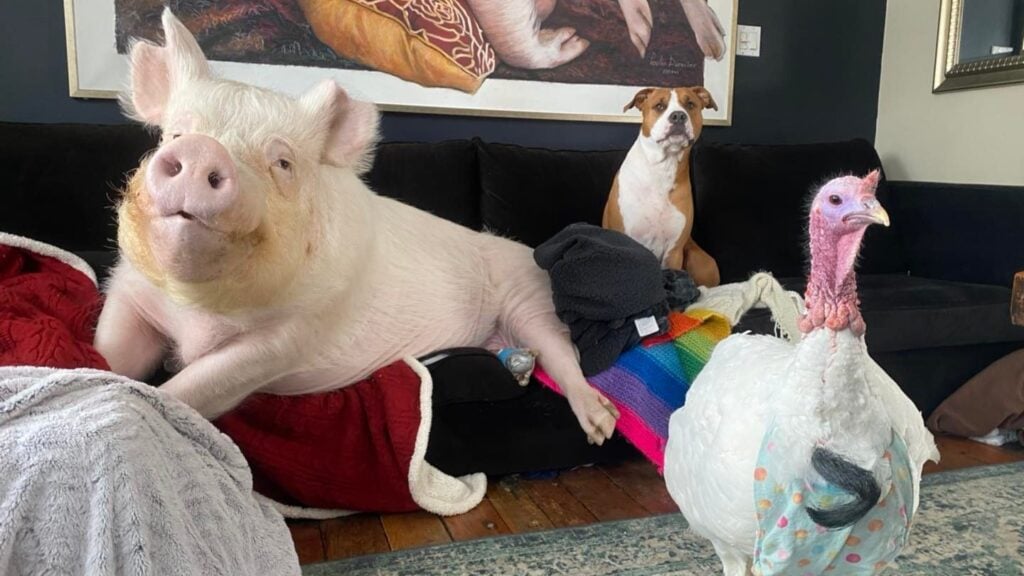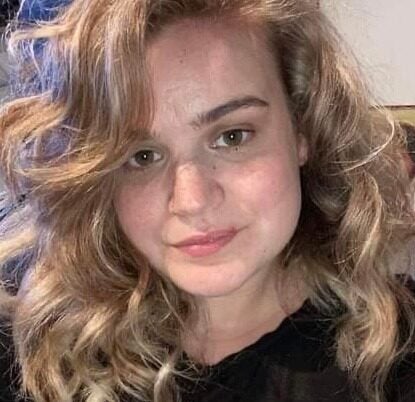More than a decade ago, the trend for micropigs or “teacup” pigs gripped us all. Social media spun the tale that pigs could be the perfect house pets: tiny, intelligent, loving, cute. Now, three of those things are absolutely true. Steve Jenkins and Derek Walters, the parents of world-famous Esther the Wonder Pig, can attest to that. But pigs aren’t supposed to be tiny.
It turns out, most of those “teacup” pigs we fell in love with on social media were just piglets. And piglets grow up to be, well, big pigs. When Jenkins met and fell in love with little Esther, she was just three pounds. Now, her weight fluctuates between 500 and 600 pounds.
“I brought her home unbeknownst to Derek,” Jenkins tells Plant Based News. “At first it was the novelty, I’d seen pictures of so-called mini-pigs before and thought this might be a cool pet to have.”
While most would have tried to rehome their pet when they realized they weren’t going to get the petite animal they signed up for, Jenkins and Walter stuck by Esther. And their love and nurturing spirits have helped lead her to capture the hearts of, literally, hundreds of thousands of people around the world. “Little did I know that this tiny girl would change the course of our lives forever,” continued Jenkins. “The adventure of a lifetime had begun and I didn’t even know it.”
Esther’s dedicated Instagram account—where Jenkins and Walter post pictures of Esther snoozing, exploring, and hanging out with her siblings (a turkey called Cornelius and a dog called Phil)—has nearly 600,000 followers. But Esther is so much more than an influencer (although she does have enviable style). She’s inspired many, including Walter and Jenkins, to think about farm animals in a new way.
Around the world, 1.5 billion pigs are killed for meat every year. But Esther proves to the world that these animals are not only sentient, but also curious, affectionate, and smart. They are worth more than a bacon sandwich.
We spoke to Jenkins about his journey with Esther, the books she inspired, and the movie that’s in the works. We also spoke about the animal sanctuary he, together with Walter, has now dedicated his life to, all thanks to that little three-pound piglet he held a decade ago.
Plant Based News: Esther is an incredibly successful pig, there’s no doubt about it. Did you realize how much she would connect with people when you first adopted her?
Steve Jenkins: It is surreal and absolutely mind-boggling. We started Esther’s page just as a way for friends and family to stay in touch and observe Esther’s antics, but one of those friends shared Esther’s page on an animal-related website and the next thing we knew Esther’s page had 10,000 likes and it never stopped! That’s been, for me anyway, incredibly overwhelming, to think of the reach that she has and the level that she’s impacting people. It’s in such a deeper and more meaningful way than either of us ever anticipated.
PBN: How do you cope with the level of fame you and Esther have now?
Jenkins: You know, we’re so busy all the time with the sanctuary and with Esther and everything that’s going on, that we rarely have a chance to step back and say, “okay, what have we done?” When I have those minutes to reflect on things, I scare myself. So much has happened and so much is happening. I never in a million years thought that I would be controlling social media pages that reach ten million people a week. It still blows my mind that she’s seen and known by that many people and that they care for her the way we do. People are fiercely protective of her online and they’re fiercely protective of Derek and I.
PBN: You’ve written books about your time with Esther, including a children’s book called The True Adventures of Esther The Wonder Pig. In the book, a pig lives with two gay dads. Why was it important for you to tell your story to children?
Jenkins: It was a chance to put a story out there for kids about our family – which is, in general, a picture of how it’s okay to be different. Compassion and kindness are such important things for kids to learn and we have a really unique way to teach them. We needed to tell this beautiful story about loving another creature that grows up to be something we weren’t expecting and to follow that commitment through. Since the release, we’ve received heartfelt messages. One from a mother said: “I wanted to thank you for teaching my four-year-old son that it’s okay to have two dads.” It is incredibly rewarding.
PBN: Can you tell us anything more about whether your story will be made into a film?
Jenkins: A lot of the details are still hush hush. But it is still in the works. Covid changed the timeline.
PBN: It’s been a 10-year journey for you both, and so much has happened in that time. But what’s the biggest thing you’ve learned from Esther along the way?
Jenkins: These amazing intelligent beings should not be subjected to the horrors that humankind imposes on them. Before Esther came along, we had the same wall up that I think a lot of people have, which is that there are two different groups of animals. There are warm, fuzzy, cuddly animals we love and dolphins. And then there are farm animals. When we met Esther, it was her intelligence and seeing her beside the dogs that made us think “they’re not really that different at all.” Esther put a face to the [meat] industry. We share Esther because we want people to build a relationship with her. We hope that opens the door and makes them start questioning everything else, we call it the “Esther Effect.”
PBN: That “Esther Effect” has led to many new ventures for you. The biggest is perhaps the Happily Ever Esther Farm Sanctuary. Why did this come about?
Jenkins: We had always planned to have a retirement property where we could rescue animals. But we envisioned it as more of a hobby farm than a public enterprise. But because of the Esther Effect, things took an unpredictable turn for the better. When we went looking at other sanctuaries, so many were full, flailing, and under great duress. So, we wanted to become part of the solution. Happily Ever Esther Farm Sanctuary was born. We now have over 70 residents and 30 of them are commercial pigs.
PBN: Because of your platform, you get a high number of requests to shelter animals. How do you cope with these and help as many animals as possible?
Jenkins: The need is so great. If we don’t have the room or resources to admit an animal, we work with the owner to try and rectify the problem that is causing them to want to re-home. If it is a situation out of their control, then we use our Esther’s Army Facebook page to assist in finding a loving forever home. Its vast network of supporters and contacts has saved and rehomed hundreds of animals. We also use that platform to shine the light on other sanctuaries and their amazing animal stories.
PBN: What’s on the cards for the future of the sanctuary?
Jenkins: We want to focus on a few things, including food and energy sustainability. We also want to provide more information to other sanctuaries, particularly about health and safety. We are also going to expand our education and advocacy – but stay true to our approach of keeping the principle of kindness front and center. And to grow our sanctuary, rescuing more animals, but also to use that platform to assist and educate people on how to keep their animals whenever a challenge arises.
PBN: And what about outside of the sanctuary? What does the future hold for you and Esther?
Jenkins: I would be lying if I said a future without Esther scares me. She’s become such an intricate part of our lives, she is in all respects, just like a daughter to us. But I take comfort in knowing that she will live forever albeit in people’s hearts. We plan on continuing to advocate for farmed animals and educating that we can all make a difference in this world simply by choosing to put peace on our plates. Going “Esther approved” doesn’t need to be about sacrifice at all, it’s just about doing what you’ve always done a little bit differently.
—
If you purchase something through a link on our site, Plant Based News may earn a commission, which helps us to provide our free services to millions of people each week.






